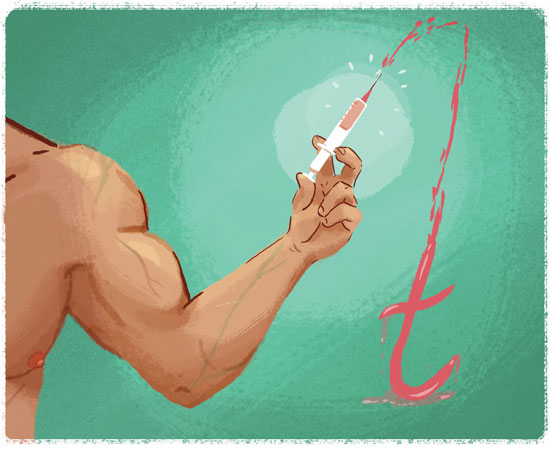T Time
Anabolic steroid use -- testosterone, in particular -- carries both scare tactics and sound warnings

It’s not much of a secret these days. To get to the size and strength level of many professional athletes, PED’s are necessary. An acronym that encompasses a large selection of pharmaceuticals, PED stands for “Performance Enhancing Drugs.” The most popular PED is the anabolic steroid, testosterone. The government labeled testosterone and other anabolic steroids as controlled substances in 1990, resulting in the ban of over-the-counter sales. Now, the only way to legally obtain them is through a prescription from your doctor. While that’s a conversation for your doctor, the conversation many people don’t want to have is one about perpetuated scare tactics and myths.
Roid Rage
Testosterone (the most commonly used anabolic steroid) is the central culprit for the “roid rage” myth. During competitive moments in one’s life, excessively high levels of testosterone can possibly make a person more aggressive. Expressions of so-called roid rage, however, seem to be the clear exception.
Testosterone shrinks testicles
This has some truth to it. The more testosterone you inject the less your body produces. As a result, the testicles, the main source of product, will shrink.
It will cause you to develop breasts
Again, there is some truth behind this statement — if you aren’t using the proper dosages and accessory medicine. When you begin injecting higher amounts of testosterone than your body is used to, you will also being producing extra estrogen to compensate. Some will begin to develop gynecomastia — or large, breast-like fat deposits in the chest.
For all of the negatives that surround testosterone supplementation, there are ways to combat and monitor all of the effects. For instance, the testicle shrinking can be fixed by a proper PCT, or Post Cycle Therapy. The PCT effectively restores testosterone production in most people, returning everything to its normal size. Gynecomastia is easily combated by taking an estrogen inhibitor, blocking the body’s estrogen receptors. That, however, is not to say there aren’t other drawbacks to supplementing the testosterone in your body.
Natural testosterone levels may never level out
By supplementing testosterone via injection or orally, you shut down your body’s natural production of the hormone. Your body recognizes that there is plenty of testosterone in the body already and reacts accordingly. Taking steroids can permanently damage this part of the body’s regulatory system, and you could end up being on TRT (testosterone replacement therapy) for the rest of your life.
Acne
If vanity is your primary reason for being in the gym, testosterone could put a damper on your ability to walk around shirtless. Acne on your face, chest and back are very common occurrences in steroid users.
Increased risk of prostate cancer
The biggest issue with injecting testosterone is the possibility of prostate cancer. There are now more studies on the subject — some of which cast doubt on such a link — of testosterone replacement therapy being the main cause of prostate cancer. It does increase the production of a prostate-specific antigen, which is a red flag for health care providers to further examine a patient’s prostate health, but the actual link is still being questioned.
There are always drawbacks to changing the way your body naturally works, and through a lack of understanding and knowledge on the subject, anabolic steroid purchasing was quickly banned in the United States. Not unlike many substances in the country, through the proper education and guidance, anabolic steroids, and especially testosterone, can be used to increase your lean muscle tissue at a significantly higher rate, and with a reasonable degree of safety.
Brandon Harrison covers health and fitness for Metro Weekly.
[Illustration by Christopher Cunetto.]
Support Metro Weekly’s Journalism
These are challenging times for news organizations. And yet it’s crucial we stay active and provide vital resources and information to both our local readers and the world. So won’t you please take a moment and consider supporting Metro Weekly with a membership? For as little as $5 a month, you can help ensure Metro Weekly magazine and MetroWeekly.com remain free, viable resources as we provide the best, most diverse, culturally-resonant LGBTQ coverage in both the D.C. region and around the world. Memberships come with exclusive perks and discounts, your own personal digital delivery of each week’s magazine (and an archive), access to our Member's Lounge when it launches this fall, and exclusive members-only items like Metro Weekly Membership Mugs and Tote Bags! Check out all our membership levels here and please join us today!



















